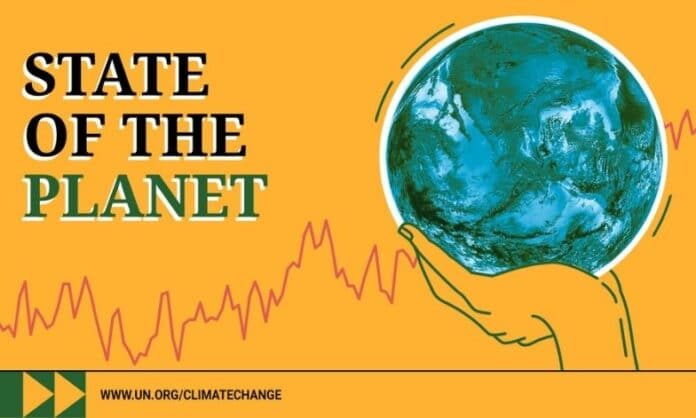UN Secretary-General António Guterres has called for bold new commitments on climate action and for the European Union to demonstrate leadership by further reducing its emissions.
In a major speech to Columbia University in New York on 2 December, on the “State of the Planet”, the Secretary-General outlined his vision on climate action.
“Now is the time for bold new commitments to raise ambition and action, to build a sustainable and resilient recovery from the pandemic, and to address the climate emergency,” Mr. Guterres told a virtual audience. “We need to build a strong coalition to get to net zero emissions.”
The Secretary-General noted encouraging announcements from China, the European Union, Japan and the Republic of Korea, as well as some of the world’s largest companies, cities and regions.
“The European Union has committed to become the first climate neutral continent by 2050 – and I expect it will decide to reduce its emissions to at least 55 per cent below 1990 levels by 2030.”
In his speech Mr. Guterres demonstrated how human activities have led to the deterioration of the natural environment, precipitating crises in climate change and biodiversity loss.
“Let’s be clear: human activities are at the root of our descent toward chaos. But that means human action can help solve it. Making peace with nature is the defining task of the 21st century. It must be the top, top priority for everyone, everywhere.”
The Secretary-General urged governments to stop building new coal power plants — and halt coal power financing domestically and overseas.
Furthermore, he called for new thinking on carbon. “It is time: To put a price on carbon…To shift the tax burden from income to carbon, and from taxpayers to polluters.”
The state of the planet is broken
Mr. Guterres painted the “State of the Planet” in dark colours, with biodiversity collapsing, one million species at risk of extinction, ecosystems disappearing before our eyes and 10 million hectares of forests lost every year.
“To put it simply, the state of the planet is broken. Dear friends, humanity is waging war on nature. This is suicidal. Nature always strikes back — and it is already doing so with growing force and fury.”
In addition, the Secretary-General referred to two major new UN reports published on 2 December, which he said “spell out how close we are to climate catastrophe.”
- A report by the World Meteorological Organization (WMO) shows that 2020 is on track to be one of the three warmest years on record globally – even with the cooling effect of this year’s La Nina. The past decade was the hottest in human history and ocean heat is at record levels.
- In the Arctic, 2020 has seen exceptional warmth, with temperatures more than 3 degrees Celsius above average – and more than 5 degrees in northern Siberia.
- Arctic sea ice in October was the lowest on record – and now re-freezing has been the slowest on record.
- Greenland ice has continued its long-term decline, losing an average of 278 gigatons a year.
- A new report by the UN Environmental Programme shows that although COVID-19 lockdowns have temporarily reduced emissions and pollution, carbon dioxide levels are still at record highs – and rising.
- Emissions are 62 per cent higher today than when international climate negotiations began in 1990.
“We are headed for a thundering temperature rise of 3 to 5 degrees Celsius this century,” Mr. Guterres concluded.
“The science is crystal clear: to limit temperature rise to 1.5-degrees Celsius above pre-industrial levels, the world needs to decrease fossil fuel production by roughly 6 per cent every year between now and 2030.
Instead, the world is going in the opposite direction — planning an annual increase of 2 per cent.”
The green switch
According to Mr. Guterres “it is time to flick the “green switch”. Not only is there a chance to simply reset the world economy, but to transform it. A sustainable economy driven by renewable energy will create new jobs, cleaner infrastructure and a resilient future.
“We must turn this momentum into a movement,” the Secretary-General said. “The central objective of the United Nations for 2021 is to build a truly Global Coalition for Carbon Neutrality.”
He argued that COVID recovery and the planet’s repair can be two sides of the same coin.
For this, three objectives have to achieved: global carbon neutrality within the next three decades, global finance has to be aligned behind the Paris Agreement, and finally, a “breakthrough” is needed on adaptation to protect the world – and especially the most vulnerable people and countries — from climate impacts.
“We have a blueprint: the 2030 Agenda, the Sustainable Development Goals and the Paris Agreement on Climate Change. The door is open; the solutions are there. Now is the time to transform humankind’s relationship with the natural world – and with each other,” the UN Secretary-General concluded in his “State of the Planet” speech.

